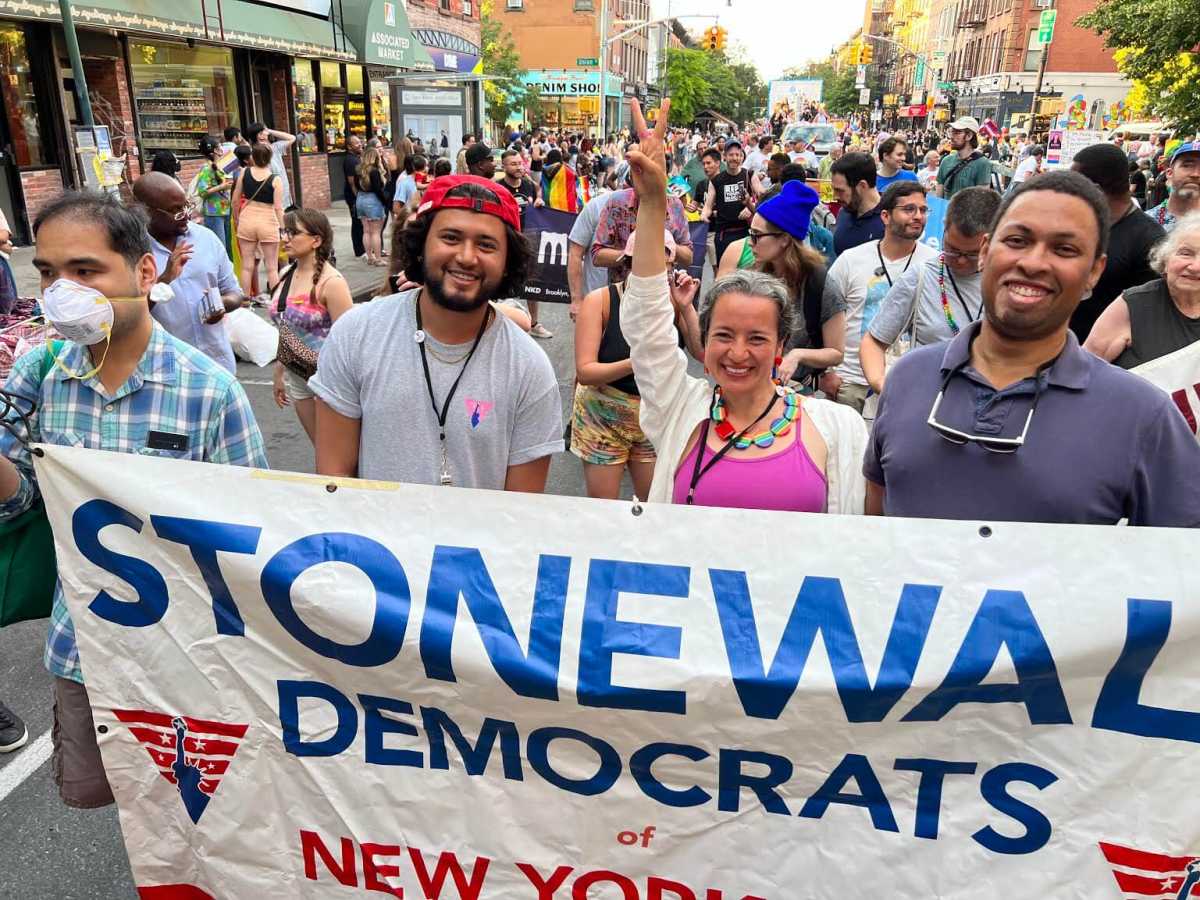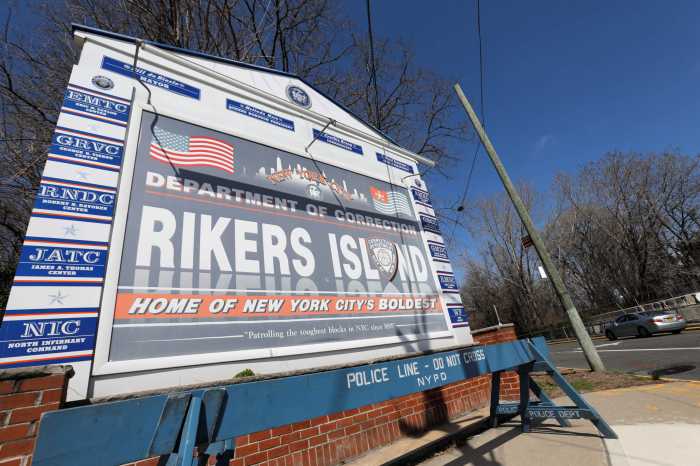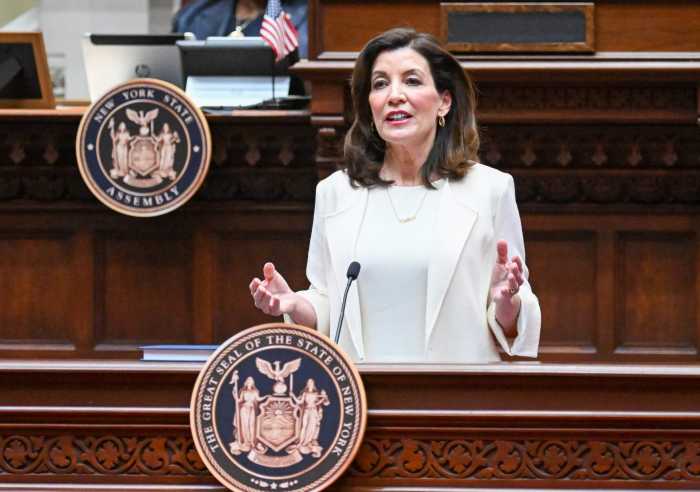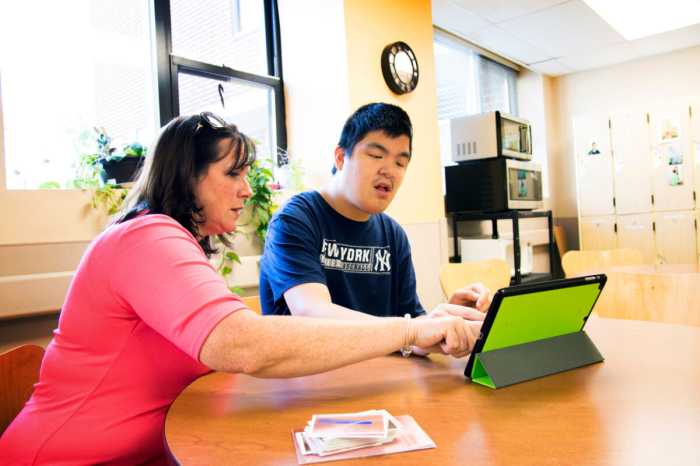As the Queer Liberation March headed south from Foley Square to Chambers Street on Pride Sunday, Ana María Archila, who is seeking the lieutenant governor nomination in Tuesday’s Democratic primary, was initially standing on the sidelines waving to the crowd.
Archila was waiting for the Brooklyn Lambda Independent Democrats’ contingent, with which she marched. During the day’s other big event — Heritage of Pride’s LGBTQ Pride Parade — she marched with Planned Parenthood, which was given the lead-off position in the wake of Friday’s devastating Supreme Court ruling striking down Roe v. Wade. As Archila marched, she also mingled with Stonewall Democratic Club of New York City members who were right behind the Planned Parenthood contingent.
Both Lambda and Stonewall, as well as the Jim Owles Liberal Democratic Club, the Lesbian and Gay Democrats of Queens, and Equality New York — all queer political groups — have endorsed Archila, as have out LGBTQ elected officials including Brooklyn State Senator Jabari Brisport, Manhattan Assemblymember Yuh-line Niou, and City Councilmembers Tiffany Cabán of Queens and Crystal Hudson and Chi Ossé of Brooklyn. Cynthia Nixon, who ran a spirited primary challenge to Governor Andrew Cuomo in 2018, is also supporting Archila.
Archila has spent most of her professional life leading organizing efforts among immigrant, people of color, low-income, and LGBTQ communities, but is probably best known for an electrifying caught-on-video 2018 confrontation with Arizona Senator Jeff Flake as he was poised to give his Judiciary Committee vote to Supreme Court nominee Brett Kavanaugh.
Archila is also a bisexual immigrant from Colombia, who, if elected, would become the first out LGBTQ and first Latina to hold statewide office.
The primary race for lieutenant governor is far from a high-profile contest, and Archila, who is running in alliance with gubernatorial hopeful Jumaane Williams, is facing off against the powers of incumbency — even if that incumbency, by former upstate Congressmember Antonio Delgado, is barely a month old. Also in the race is former Brooklyn Councilmember Diana Reyna, who is campaigning with Long Island Congressmember Tom Suozzi, who, like Williams, in challenging Governor Kathy Hochul.
In the governor’s race, Hochul, who has amassed a nearly $35 million war chest, is the prohibitive favorite. The lieutenant governor’s contest, on which there is no public polling, appears to be another matter. Though Delgado has spent at least $1.5 million on television ads, he is not yet well known statewide, and Archila has been campaigning for most of the year, picking up a wide array of progressive endorsements beyond LGBTQ groups — most prominently from the Working Families Party and Congressmember Alexandria Ocasio-Cortez.
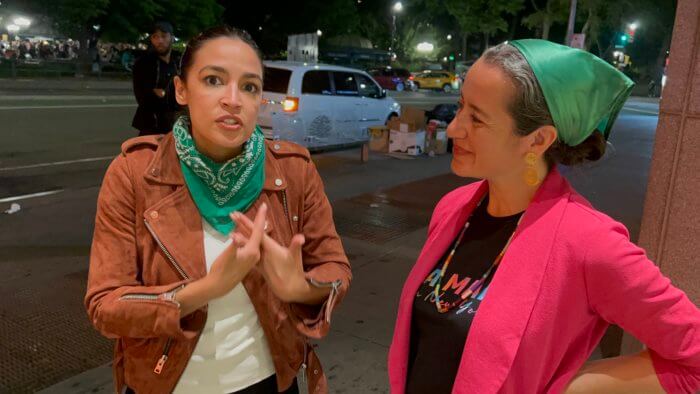
Archila’s high profile on Pride Sunday raises the question of whether she can count on a strong turnout in the LGBTQ community and if that, in turn, could make the difference in her run.
Derek Gaskill, Lambda’s co-president, told Gay City News that it is “paramount to have LGBTQ people at the table,” but hastened to add that it is her policy positions on a wide array of progressive concerns — such as the proposed Good Cause Eviction measure to strengthen tenancy rights of New Yorkers not otherwise protected by rent stabilization regulations — that makes Archila the right candidate.
“It’s not just that she’s from the community but also that she advocates for working class people and immigrants on policy issues important to them,” Gaskill said. “We know that LGBTQ people are disproportionately affected by low-income socioeconomic challenges.”
He added, “And she represents a unique intersectionality as a Latina, an immigrant, a woman, and a mother.”
In advocating on issues like the successful effort in Albany to repeal a loitering measure dubbed Walking While Trans — because of the way it often targeted transgender women — Gaskill said, Archila “was able to bring all her identities to bear.”
Gaskill would not hazard a guess on the difficult question of how large a share of the electorate LGBTQ voters represent, but he said the enormous turnout on Sunday at two different marches demonstrates the vibrancy and commitment of the community.
Ken Sherrill, a professor emeritus of political science at Hunter College who has long studied elections in the city, seconded Gaskill’s perspective on the strength of LGBTQ voters’ motivation.
“It’s hard to find other demographic groups who are more active voters,” he said. “We also know that LGBTQ voters are more likely to seek out news,” and so become better informed about what will likely be a low-turnout summer primary.
Sherrill said that the percentage of LGBTQ voters in New York City “hovers around 7 to 8% but in a low-turnout election could be as high as 10%.”
Statewide estimates of the share of the electorate represented by LGBTQ voters are difficult to count on given the imperfections of exit polling, especially when it comes to subsets of the total. In 2020, for example, exit polls conducted by Edison Research showed that only 4% of New York voters were LGBTQ, in a year when it estimated that nationwide the figure was 7%. That disparity is difficult to reconcile with what our eyes tell us about the size of the community in New York.
Other data point to a very different picture. In the 2012 presidential election, exit polling showed that lesbian, gay, and bisexual voters made up 7% of the state’s electorate. In the 2013 Democratic mayoral primary in the city, an estimated 9% of all voters were lesbian, gay, or bisexual.
It’s a safe bet that at least 7 to 8% of the state’s voters are LGBTQ — and, as Sherrill noted, the number who participate tomorrow, amidst low turnout overall, could easily exceed that percentage.
But Sherrill noted an important caveat: if LGBTQ turnout is disproportionately high, the community’s impact “would be magnified if effectively organized.” He noted that even as a member of numerous political clubs — LGBTQ and otherwise — and as someone who is on every prime voter list, he has heard very little about tomorrow’s primary.
Allen Roskoff, the Jim Owles club president, echoed Sherrill’s assessment.
“Historically lieutenant governor races have not taken center stage,” he said. “There will be an extremely small number of votes, so any block can swing the contest. If the LGBTQ community has come to know Archila, she could win.”
His club, Roskoff said, has done a mailing to tens of thousands of voters highlighting its endorsements including Archila and has handed out 15,000 palm cards at recent LGBTQ events. Archila spoke at last week’s Jim Owles Gay Pride Gala & Awards Ceremony about “the upcoming crisis” on abortion.
Gaskill said Lambda’s leading focus has been on district leader races and contested State Assembly contests, but it participated in one Archila phone banking effort. He also noted that a number of its down-ballot candidates — such as Assembly hopeful Samy Nemir Olivares and two district leader contenders — have cross-endorsements with Archila, meaning that Lambda’s on-the-ground efforts support her as well as the cross-endorser.
The ground game tomorrow undoubtedly will be crucial if Archila hopes to upset Delgado. She is voicing optimism that her work with LGBTQ political activists can make the difference.
“I’ve been overwhelmed by the support from LGBTQ leaders and political clubs around the state,” Archila said in a written statement to Gay City News. “Part of what I’ve sensed is a hunger for representation at the statewide level. The other part has been that our campaign has offered bold proposals to the big problems our communities face. Queer New Yorkers want their leaders to not just chip around the edges, but provide a clear platform to build and preserve affordable housing, make health care universal, tackle climate change, and more — and that’s what we’ve done. My campaign has tried to live up to the words of Urvashi Vaid, who said: ‘Gay people do not fight for freedom to live in a lavender bubble, but in a more just society.’”

